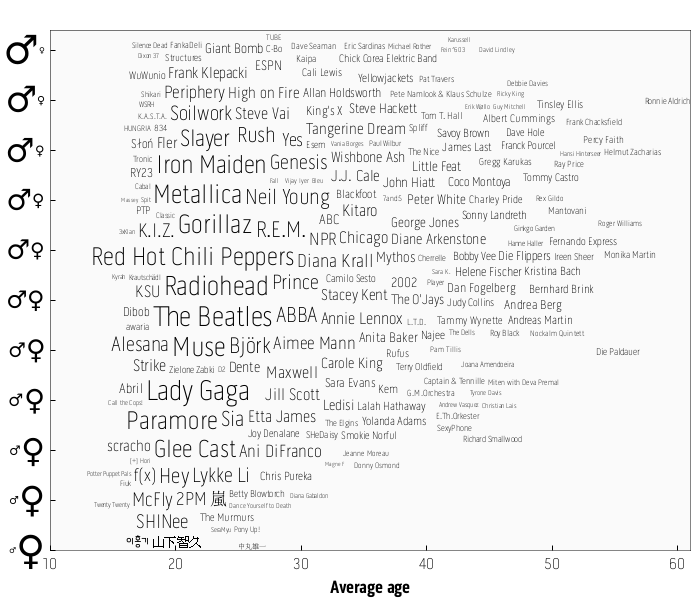
Young and male are in the top right corner. As are Metallica, Slayer, and Iron Maiden, the awesomest bands ever. Not surprisingly my tastes are younger than my body (consistent with the text analysis of this blog), although I do like the Yellowjackets (admittedly haven't listened to them in years).
One obvious observation: the lower right is blank, and size corresponds with numbers of mentions. This suggests that people talk about music less as they get older, and that older women don't talk about it at all. I definitely listen to less music than I did even 5 years ago.
This may be consistent with the observation that music is unique among types of art in that people, especially young people, use music to define identity and community, sometimes to the point of physical violence against outsiders. You don't see riots with surrealists fighting impressionists or gothic and Victorian architecture fans wearing T-shirts to advertise their loyalty and lifestyle. No specific hairstyle has ever been associated, to my knowledge, with being a fan of futurist sculpture. Where music is concerned, aggressive marketing certainly feeds the communities and identities relating to pop music but it doesn't create the tendency to begin with.
Consequently, my hypothesis is that strongly-identified musical subcultures are a form of signaling identity. Support:
- Music is more important to people below 30, especially teens and late 20s) who are still forming their identities
- Music fades from prominence in people's lives at exactly that time in life when people get married (no need to signal to mates) or have careers that define them more concretely
- The types of music that most attract young people contain lyrics that allude to, or performers that appear to engage in, a fantasy lifestyle that the music fan does not actually engage in (rap and crime, metal and evil, girl-pop and being a princess, etc.)
- Music is less important to women across all ages; women don't rely on active signaling for mate finding to the same degree that men do.
- Genres of music that are good for signaling must be exclusive of social values at large. No young male music fan wants to follow a band that dresses and acts normally and respectfully and mundanely, no matter how good the music is.
That we do see this behavior with some genres of pop music certainly says something about aggressive marketing, but again, we still don't see the "mannerist lifestyle" being marketed, or even twelve-tone serialism for that matter. There is something about popular music that makes it uniquely well-suited to forming subcultures around - the listening experience is passive, can produce strong emotional responses, and as mass-market art, the works tend to be less nuanced than other types of music. If some other art meets these same requirements I would argue that the same thing will happen, and maybe it already has with anime.
2 comments:
You missed the obvious conclusion:
Old people are hermaphrodites.
I'm not gonna lie to you. That's hot.
Post a Comment